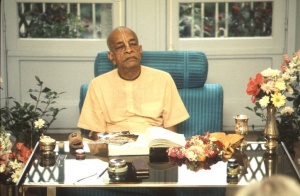CC Madhya 17.127 (1975): Difference between revisions
(Vanibot #0027: CCMirror - Mirror CC's 1996 edition to form a basis for 1975) |
(Vanibot #0020: VersionCompareLinker - added a link to the Version Compare feature) |
||
| Line 2: | Line 2: | ||
<div style="float:left">'''[[Sri Caitanya-caritamrta (1975)|Śrī Caitanya-caritāmṛta (1975)]] - [[CC Madhya (1975)|Madhya-līlā]] - [[CC Madhya 17 (1975)|Chapter 17: The Lord Travels to Vṛndāvana]]'''</div> | <div style="float:left">'''[[Sri Caitanya-caritamrta (1975)|Śrī Caitanya-caritāmṛta (1975)]] - [[CC Madhya (1975)|Madhya-līlā]] - [[CC Madhya 17 (1975)|Chapter 17: The Lord Travels to Vṛndāvana]]'''</div> | ||
<div style="float:right">[[File:Go-previous.png|link=CC Madhya 17.126 (1975)|Madhya-līlā 17.126]] '''[[CC Madhya 17.126 (1975)|Madhya-līlā 17.126]] - [[CC Madhya 17.128 (1975)|Madhya-līlā 17.128]]''' [[File:Go-next.png|link=CC Madhya 17.128 (1975)|Madhya-līlā 17.128]]</div> | <div style="float:right">[[File:Go-previous.png|link=CC Madhya 17.126 (1975)|Madhya-līlā 17.126]] '''[[CC Madhya 17.126 (1975)|Madhya-līlā 17.126]] - [[CC Madhya 17.128 (1975)|Madhya-līlā 17.128]]''' [[File:Go-next.png|link=CC Madhya 17.128 (1975)|Madhya-līlā 17.128]]</div> | ||
{{CompareVersions|CC|Madhya 17.127|CC 1975|CC 1996}} | |||
{{RandomImage}} | {{RandomImage}} | ||
==== TEXT 127 ==== | ==== TEXT 127 ==== | ||
<div class="verse"> | <div class="verse"> | ||
:tina-bāre | :tina-bāre 'kṛṣṇa-nāma' nā āila tāra mukhe | ||
: | :'avajñā'te nāma laya, śuni' pāi duḥkhe | ||
</div> | </div> | ||
| Line 18: | Line 17: | ||
<div class="synonyms"> | <div class="synonyms"> | ||
tina-bāre—three times; kṛṣṇa-nāma—the holy name of Kṛṣṇa; nā āila—did not come; tāra mukhe—in his mouth; | tina-bāre—three times; kṛṣṇa-nāma—the holy name of Kṛṣṇa; nā āila—did not come; tāra mukhe—in his mouth; avajñā'te—in contempt; nāma laya—takes Your name; śuni'-hearing; pāi duḥkhe—I was very much aggrieved. | ||
</div> | </div> | ||
| Line 25: | Line 24: | ||
<div class="translation"> | <div class="translation"> | ||
"Although he spoke Your name three times, he did not utter the name of Kṛṣṇa. Because he uttered Your name in contempt, I was very much aggrieved. | |||
</div> | </div> | ||
| Line 32: | Line 31: | ||
<div class="purport"> | <div class="purport"> | ||
Prakāśānanda Sarasvatī vilified and blasphemed Śrī Caitanya Mahāprabhu. Words like brahma, caitanya, ātmā, paramātmā, jagadīśa, īśvara, virāṭ, vibhu, bhūmā, viśvarūpa and vyāpaka all indirectly indicate Kṛṣṇa. However, the chanter of these names is not actually attracted to the Supreme Personality of Godhead Kṛṣṇa and His transcendental pastimes. One may get a little light from these names, but one cannot understand that the holy name of the Lord is identical with the Lord. One considers the | Prakāśānanda Sarasvatī vilified and blasphemed Śrī Caitanya Mahāprabhu. Words like brahma, caitanya, ātmā, paramātmā, jagadīśa, īśvara, virāṭ, vibhu, bhūmā, viśvarūpa and vyāpaka all indirectly indicate Kṛṣṇa. However, the chanter of these names is not actually attracted to the Supreme Personality of Godhead Kṛṣṇa and His transcendental pastimes. One may get a little light from these names, but one cannot understand that the holy name of the Lord is identical with the Lord. One considers the Lord's names material due to a poor fund of knowledge. Māyāvādī philosophers and the pañcopāsakas cannot in the least understand the existence of the spiritual world and the blissful variegatedness there. They cannot understand the Absolute Truth and its spiritual varieties-name, form, qualities and pastimes. Consequently they conclude that Kṛṣṇa's transcendental activities are māyā. Due to this, one has to directly cultivate knowledge about the holy name of the Lord. Māyāvādī philosophers do not know this fact, and therefore they commit great offenses. One should not hear anything about Kṛṣṇa or devotional service from the mouths of Māyāvādī impersonalists. | ||
</div> | </div> | ||
Latest revision as of 10:25, 27 January 2020

A.C. Bhaktivedanta Swami Prabhupada
TEXT 127
- tina-bāre 'kṛṣṇa-nāma' nā āila tāra mukhe
- 'avajñā'te nāma laya, śuni' pāi duḥkhe
SYNONYMS
tina-bāre—three times; kṛṣṇa-nāma—the holy name of Kṛṣṇa; nā āila—did not come; tāra mukhe—in his mouth; avajñā'te—in contempt; nāma laya—takes Your name; śuni'-hearing; pāi duḥkhe—I was very much aggrieved.
TRANSLATION
"Although he spoke Your name three times, he did not utter the name of Kṛṣṇa. Because he uttered Your name in contempt, I was very much aggrieved.
PURPORT
Prakāśānanda Sarasvatī vilified and blasphemed Śrī Caitanya Mahāprabhu. Words like brahma, caitanya, ātmā, paramātmā, jagadīśa, īśvara, virāṭ, vibhu, bhūmā, viśvarūpa and vyāpaka all indirectly indicate Kṛṣṇa. However, the chanter of these names is not actually attracted to the Supreme Personality of Godhead Kṛṣṇa and His transcendental pastimes. One may get a little light from these names, but one cannot understand that the holy name of the Lord is identical with the Lord. One considers the Lord's names material due to a poor fund of knowledge. Māyāvādī philosophers and the pañcopāsakas cannot in the least understand the existence of the spiritual world and the blissful variegatedness there. They cannot understand the Absolute Truth and its spiritual varieties-name, form, qualities and pastimes. Consequently they conclude that Kṛṣṇa's transcendental activities are māyā. Due to this, one has to directly cultivate knowledge about the holy name of the Lord. Māyāvādī philosophers do not know this fact, and therefore they commit great offenses. One should not hear anything about Kṛṣṇa or devotional service from the mouths of Māyāvādī impersonalists.